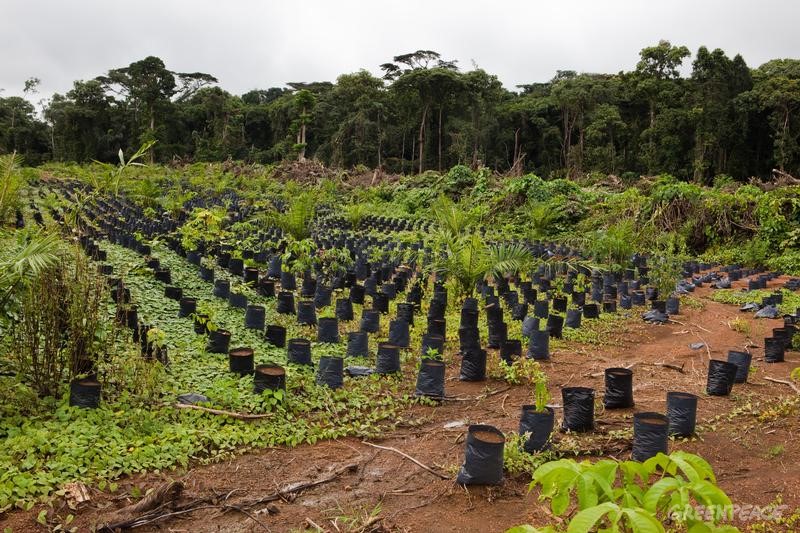TALANGAYE, Cameroon — At the main gate of the Herakles Farms plantation, a large billboard reads, “Contributing to a sustainable future for Cameroon.” The gate is little more than a bamboo pole hung across a dirt road, but security guards won’t let just anyone in. “No visitors,” one said when I asked permission to enter. “You need a pass from management.”
This is no ordinary farm. Several years ago, Herakles Farms — then an affiliate of Herakles Capital, a New York private investment firm — negotiated a deal with the Cameroonian government to develop a palm oil plantation in the country’s Southwest Region, a province known for its lush rain forests and volcano, Mount Cameroon. The plantation would be massive: some 280 square miles, more than 12 times the size of Manhattan. Upon full implementation, Herakles Farms claimed, the plantation would be one of the biggest commercial palm oil operations in Africa.
But the project, now in its fifth year, is highly controversial; it faces strong opposition both at home and abroad. Local opponents have accused the company of using donations of goods and services to garner support. Scientists have challenged Herakles’s claims of environmental sustainability. And numerous observers question the economic benefits promised for the surrounding region, fearing the project is much more likely to strip communities of land and livelihoods than it is to lift them out of poverty.
In 2012, I set out to investigate the claims against the project, but my queries to Herakles managers all went unanswered, save for a single, brief conversation with the Cameroon in-country manager of operations — an American — that ended with him angrily telling me to never contact the company again. So on a return trip to the area in early 2013, I went directly to the plantation.
When I was stopped at the gate, I decided to access the plantation through the forest that surrounds it, with two local human rights activists and a hunter, who served as a guide. The hunter, a compact, muscular man in his early 30s, cleared brush with his machete as he walked. He pointed out his own farm — where he plants cocoa, plantains, and pineapple among the towering trees — as well as wild nutmeg and cashew trees, bush peppers, bush mangoes, leaves for wrapping and cooking food, and a tree with nuts used to make cooking oil. There were also animal tracks and an uprooted area where, the guide said, river hogs had recently been digging. He showed us where he hunts crocodiles and porcupines.
Under the canopy the scene was dark and damp. Butterflies flitted in and out of the light shafts, amid a cacophony of buzzing, chirping, and hooting.
After walking for about two hours, a bright, white light shone ahead: the edge of the forest. As we walked past the last trees into an empty field, the sounds of the forest ended abruptly and all was silent.
The cleared area was a desert: dry and brown, dotted with stacks of giant logs. The cleared area was a desert: dry and brown, dotted with stacks of giant logs. Everything had been bulldozed — tangled heaps of dead wood and vines running up and down the length of the clearing created borders for planting rows. Giant black flies hovered around the piles of rotting vegetation. This was the plantation. In the middle of each row stood scraggly oil-palm seedlings recently moved from a nursery. The guide explained that many of the plants would die; they had been transplanted too late and would not survive until the next rains. Standing there, amid the desolation, I recalled the voices of local villagers: The forest is our life. Because of the deal their government struck with Herakles Farms, that life is now in danger.
Continue Reading
Author: by Christiane Badgley




